高一英语_人教版_Unit_5_全单元教案
- 格式:doc
- 大小:245.50 KB
- 文档页数:44
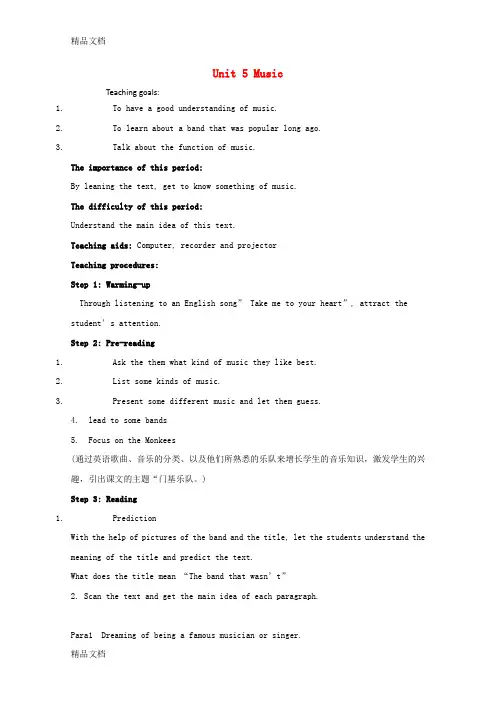
Unit 5 MusicTeaching goals:1. To have a good understanding of music.2. To learn about a band that was popular long ago.3. Talk about the function of music.The importance of this period:By leaning the text, get to know something of music.The difficulty of this period:Understand the main idea of this text.Teaching aids: Computer, recorder and projectorTeaching procedures:Step 1: Warming-upThrough listening to an English song” Take me to your heart”, attract the stu dent’s attention.Step 2: Pre-reading1. Ask the them what kind of music they like best.2. List some kinds of music.3. Present some different music and let them guess.4. lead to some bands5. Focus on the Monkees(通过英语歌曲、音乐的分类、以及他们所熟悉的乐队来增长学生的音乐知识,激发学生的兴趣,引出课文的主题“门基乐队。
)Step 3: Reading1. PredictionWith the help of pictures of the band and the title, let the students understand the meaning of the title and predict the text.What does the title mean “The band that wasn’t”2. Scan the text and get the main idea of each paragraph.Para1 Dreaming of being a famous musician or singer.Para2 How a band is formed?Para3 The Monkees got their start in a different way.Para4 How The Monkees became popular and developed as a real2. Detailed readingTrue or False Exercises.( T )1.Most musicians meet and form a band because they like to write and play music.( F)2. Each week the group that was called “The Beatles” would play a song or two written by other musicians.(T)3. “The Monkees” broke up in about 1970, but reunited in mid-1980s.(F)4. Students form a band to play in the street so that they can attract passers–by.3. Replace the following sentenceMany people think it important to have money and become famous.A lot of people attach great importance to becoming rich and famous4. Explain the difficult phrases.1)To think something is important and should be considered seriously(看重,重视)2) The musicians were to play jokes on each other as well as play music, most of whichwas based loosely on the Beatles.3) What’s the writer’s attitude towards the band?A. LikesB. DislikesC. Not mentioned(因为高考中阅读理解和阅读表达有替换、翻译以及深层理解题目的考查,这些又是学生的难点,所以我在阅读中加强了此类题目的训练)5 . a brief Summery of the band1) At first not a real band2) Play jokes as well as play music3) A year or so became serious about their music4) Became the most popular band in the USA.5) “I’m a believer”, top 10 hits6) Broke up in about 1970and reunited in the mid-1980s.Step4 Enjoy the VideoThe most famous song” I am A believer” by the MonkeesStep 5 DiscussionHow does music make you feel ?It makes me feel happy/confident ….I prefer /hate… because….If I am worried/frightened…I like to….I enjoy/appreciate…because….I attach great importance to…Step 6 SummaryMusic is fun and for your spirit!Try many different styles of music, and always remember that music will never be a waste of time.Without music, life is a journey through a desert.Step7 HomeworkWrite a short passage about what you feel about music.。
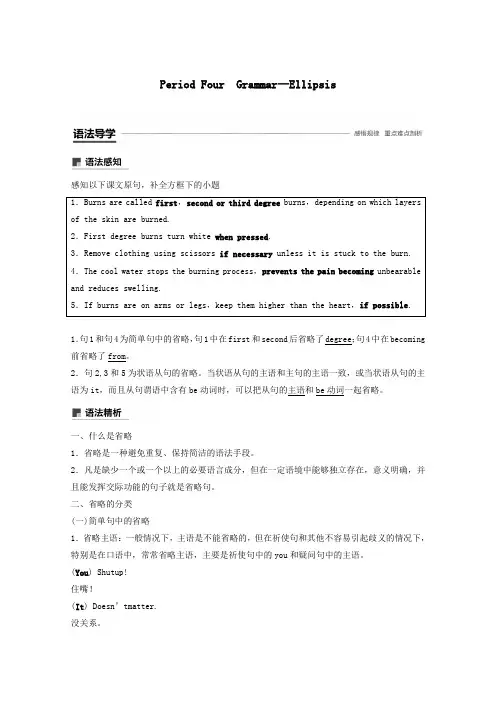
Period Four Grammar—Ellipsis感知以下课文原句,补全方框下的小题1.句1和句4为简单句中的省略,句1中在first和second后省略了degree;句4中在becoming 前省略了from。
2.句2,3和5为状语从句的省略。
当状语从句的主语和主句的主语一致,或当状语从句的主语为it,而且从句谓语中含有be动词时,可以把从句的主语和be动词一起省略。
一、什么是省略1.省略是一种避免重复、保持简洁的语法手段。
2.凡是缺少一个或一个以上的必要语言成分,但在一定语境中能够独立存在,意义明确,并且能发挥交际功能的句子就是省略句。
二、省略的分类(一)简单句中的省略1.省略主语:一般情况下,主语是不能省略的,但在祈使句和其他不容易引起歧义的情况下,特别是在口语中,常常省略主语,主要是祈使句中的you和疑问句中的主语。
(You) Shutup!住嘴!(It) Doesn’tmatter.没关系。
2.省略宾语:当上、下或前、后两个句子的宾语一致时,下句或后句常省略宾语。
—DoyouknowMissGao?—Idon’tknow (her).——你认识高女士吗?——不认识。
3.省略主语和谓语(或谓语的一部分):在某些具体的场合下,主语和谓语都很明确,此时为了简化或显得亲切等,可将主语和谓语(或谓语的一部分)同时省略,只剩下表语、宾语、状语或其他成分。
(Youcome) Thisway,please.请这边走。
(省略了主语和谓语)(Haveyou) Gotanyink?你有墨水吗?(省略了主语和谓语的一部分)(二)并列句中的省略一般来说,在后一并列句中凡是与上文相同的成分通常都要省略。
Myroomisonthefifthfloor,andhers (is) ontheeighth (floor).我的房间在五楼,而她的在八楼。
(三)复合句中的省略1.状语从句中的省略当状语从句的主语和主句的主语一致或从句的主语为it,且从句谓语中含有be动词时,省略状语从句中的主语和be动词。
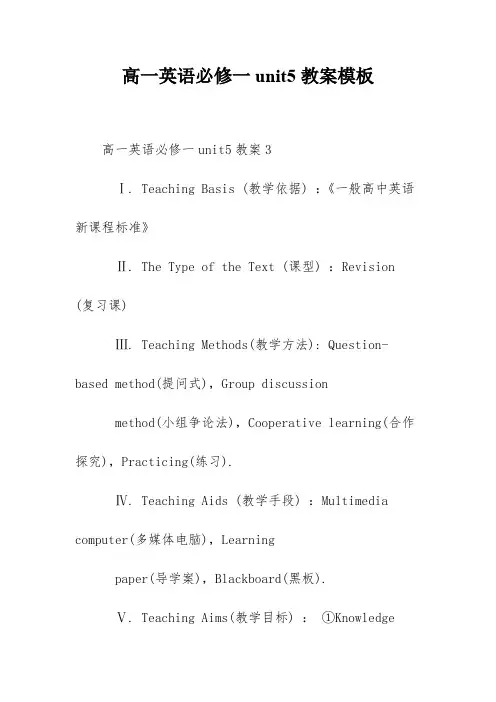
高一英语必修一unit5教案模板高一英语必修一unit5教案3Ⅰ. Teaching Basis (教学依据) :《一般高中英语新课程标准》Ⅱ. The Type of the Text (课型) :Revision (复习课)Ⅲ. Teaching Methods(教学方法): Question-based method(提问式),Group discussionmethod(小组争论法),Cooperative learning(合作探究),Practicing(练习).Ⅳ. Teaching Aids (教学手段) :Multimedia computer(多媒体电脑),Learningpaper(导学案),Blackboard(黑板).Ⅴ. Teaching Aims(教学目标) :①Knowledgeaims(学问目标):words: achievement, specialist, organization, hard-working, confident.. phrases: put to death, mean doing, eitheror, the bond between, structure: only+., It is/was+.+that. grammar: Subject-verb agreement.②Ability aims(力量目标): Develop the students ability to use the importantlanguage points, enable students to describe people using the adjectives.③Emotional aims(情感目标): Encourage the students to think about what makes aperson great.Ⅵ. Teaching focuses(教学重点):Get the students to review and consolidate what theyhave learned in this unit.Ⅶ. Teaching difficulties(教学难点):Get the students to turn what they have learned into their ability.Ⅷ.Teaching procedure(教学过程): Step 1 复习学案状况反馈(1分钟)Step 2 lead-in :通过图片展现的方式,过渡到学问竞答类节目《一站究竟》,本节课也将仿照这种模式授课。
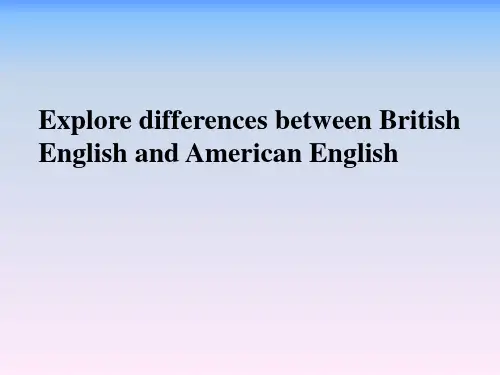
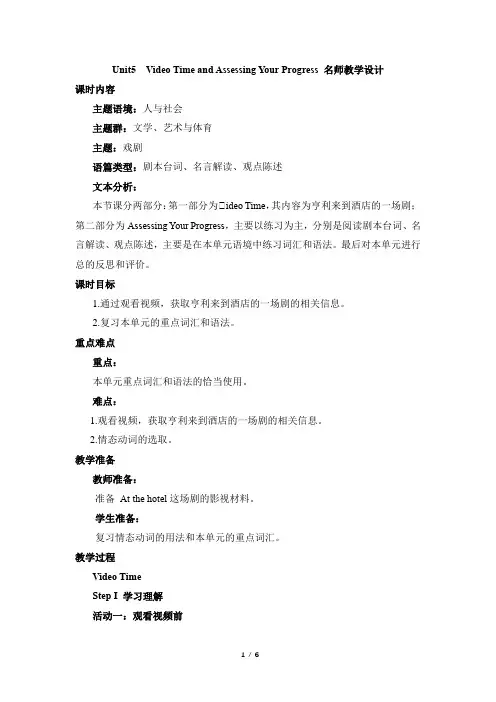
Unit5 Video Time and Assessing Your Progress 名师教学设计课时内容主题语境:人与社会主题群:文学、艺术与体育主题:戏剧语篇类型:剧本台词、名言解读、观点陈述文本分析:本节课分两部分:第一部分为Ⅴideo Time,其内容为亨利来到酒店的一场剧;第二部分为Assessing Your Progress,主要以练习为主,分别是阅读剧本台词、名言解读、观点陈述,主要是在本单元语境中练习词汇和语法。
最后对本单元进行总的反思和评价。
课时目标1.通过观看视频,获取亨利来到酒店的一场剧的相关信息。
2.复习本单元的重点词汇和语法。
重点难点重点:本单元重点词汇和语法的恰当使用。
难点:1.观看视频,获取亨利来到酒店的一场剧的相关信息。
2.情态动词的选取。
教学准备教师准备:准备At the hotel这场剧的影视材料。
学生准备:复习情态动词的用法和本单元的重点词汇。
教学过程Video TimeStep I 学习理解活动一:观看视频前1. Look at the characters listed in the box and predict who will appear in this film clip.2.what do you think this scene is about?Choose the best answer.A. Henry Adams lost his bank note at the hotel.B. Henry Adams fell in love with Portia at the hotel.C. Henry Adams received a warm reception at the hotel.Suggested answer:C【设计意图】在观看视频之前,通过预测故事人物,影片主要内容,为学生理解视频内容做好铺垫。
活动二:观看视频1.Check your answers in Before You Watch.2.Put the events in the correct order.The real Henry Adams appears.Henry makes friends with the man.The doorman thinks the man is henry,and so he invites him inside.A man appears wearing a hat.The hotel manager realises he has made a mistake.Suggested answers:3—5—2—1—4Step Ⅴ 应用实践活动三:获取与梳理Answer the questions(1)Why do the people at the hotel mistake the man for Henry Adams?(2)The man seems odd to the hotel workers. Why are they so nice to him?(3)How do the hotel workers treat the man when they discover that he is not Henry?Why?(4)What does the man do for a job?(5)Why does Henry want to make friends with the man?Suggested answers:(1)The hotel staff are looking for a wealthy American who looks poor. When the man walks up to the hotel,he puts his bag down and stands next to a horse-drawn cab The staff then make the natural mistake of assuming that he is the wealthy American,as he also looks poor,yet it looks like he has gotten out of an expensive cab.(2)They think he is an eccentric millionaire.(3)They treat him rudely because they realise he is not Henry,the millionaire.(4)He is a strongman in a circus.(5)Henry is lonely,and the man is the only person in London so far who hasn’t treated him strangely.【设计意图】通过排序、回答问题,让学生在观影过程中理清楚事件发生的来龙去脉以及重点关注人物态度的转变,而不是单纯地看热闹,重点是思考。
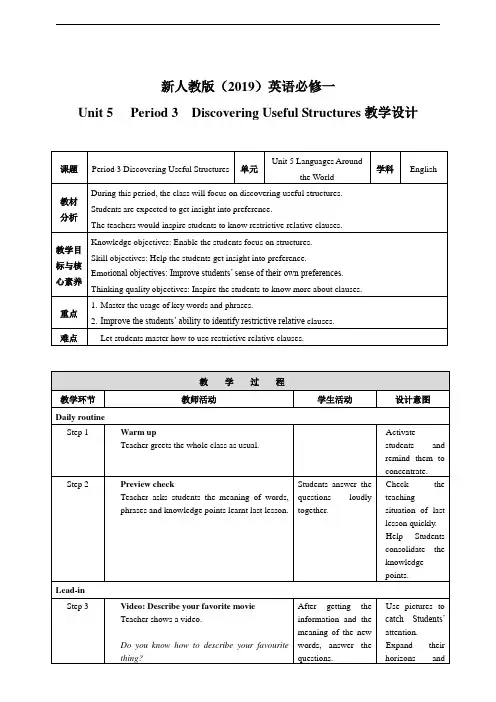
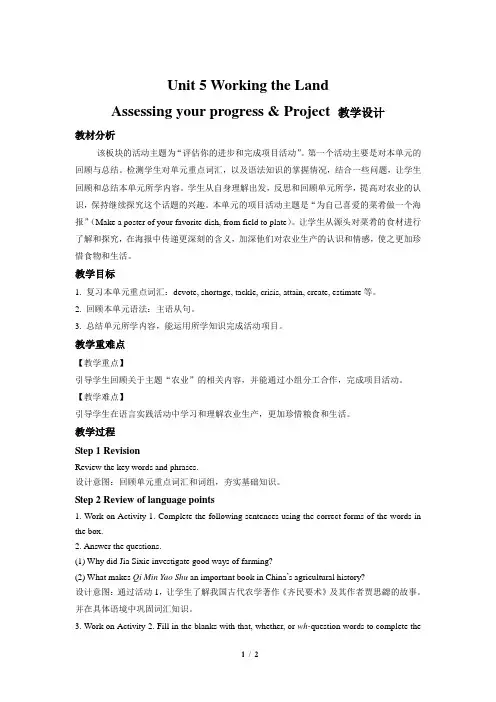
Unit 5 Working the LandAssessing your progress & Project 教学设计教材分析该板块的活动主题为“评估你的进步和完成项目活动”。
第一个活动主要是对本单元的回顾与总结。
检测学生对单元重点词汇,以及语法知识的掌握情况,结合一些问题,让学生回顾和总结本单元所学内容。
学生从自身理解出发,反思和回顾单元所学,提高对农业的认识,保持继续探究这个话题的兴趣。
本单元的项目活动主题是“为自己喜爱的菜肴做一个海报”(Make a poster of your favorite dish, from field to plate)。
让学生从源头对菜肴的食材进行了解和探究,在海报中传递更深刻的含义,加深他们对农业生产的认识和情感,使之更加珍惜食物和生活。
教学目标1. 复习本单元重点词汇:devote, shortage, tackle, crisis, attain, create, estimate等。
2. 回顾本单元语法:主语从句。
3. 总结单元所学内容,能运用所学知识完成活动项目。
教学重难点【教学重点】引导学生回顾关于主题“农业”的相关内容,并能通过小组分工合作,完成项目活动。
【教学难点】引导学生在语言实践活动中学习和理解农业生产,更加珍惜粮食和生活。
教学过程Step 1 RevisionReview the key words and phrases.设计意图:回顾单元重点词汇和词组,夯实基础知识。
Step 2 Review of language points1. Work on Activity 1. Complete the following sentences using the correct forms of the words in the box.2. Answer the questions.(1) Why did Jia Sixie investigate good ways of farming?(2) What makes Qi Min Yao Shu an important book in China’s agricultural history?设计意图:通过活动1,让学生了解我国古代农学著作《齐民要术》及其作者贾思勰的故事。
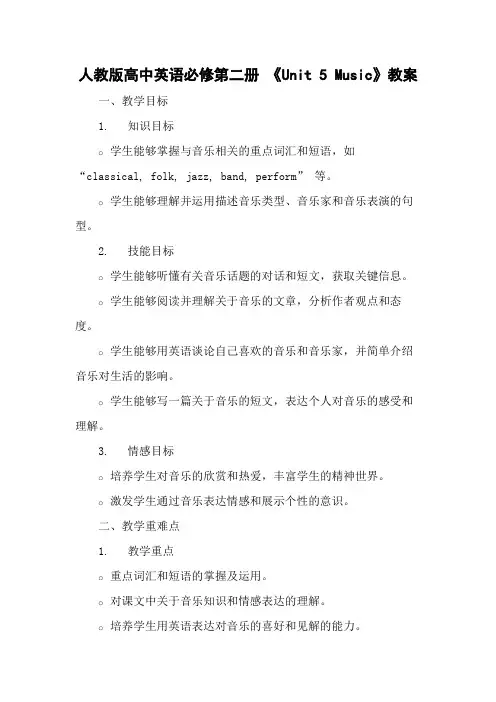
人教版高中英语必修第二册 《Unit 5 Music》教案一、教学目标1.知识目标o学生能够掌握与音乐相关的重点词汇和短语,如 “classical, folk, jazz, band, perform” 等。
o学生能够理解并运用描述音乐类型、音乐家和音乐表演的句型。
2.技能目标o学生能够听懂有关音乐话题的对话和短文,获取关键信息。
o学生能够阅读并理解关于音乐的文章,分析作者观点和态度。
o学生能够用英语谈论自己喜欢的音乐和音乐家,并简单介绍音乐对生活的影响。
o学生能够写一篇关于音乐的短文,表达个人对音乐的感受和理解。
3.情感目标o培养学生对音乐的欣赏和热爱,丰富学生的精神世界。
o激发学生通过音乐表达情感和展示个性的意识。
二、教学重难点1.教学重点o重点词汇和短语的掌握及运用。
o对课文中关于音乐知识和情感表达的理解。
o培养学生用英语表达对音乐的喜好和见解的能力。
2.教学难点o如何帮助学生准确运用丰富的词汇和句型描述音乐。
o引导学生深入理解音乐的内涵和价值。
三、教学方法1.视听教学法:通过播放音乐、视频等让学生直观感受音乐的魅力。
2.讨论交流法:组织学生讨论音乐相关话题,促进学生思维碰撞和语言表达。
3.情景创设法:创设音乐场景,让学生在情境中学习和运用语言。
四、教学过程(一)导入(5 分钟)1.播放一段不同类型的音乐片段,如古典音乐、流行音乐、摇滚音乐等。
2.提问学生:What kinds of music do you hear? How do they make you feel?(二)词汇教学(10 分钟)1.展示本单元的重点词汇和短语,结合音乐实例进行讲解。
2.开展词汇游戏,如音乐词汇猜猜猜,加强学生对词汇的记忆和理解。
(三)阅读前准备(5 分钟)1.让学生观察课文标题和图片,预测文章内容。
2.提出一些引导性问题,如:What do you think thepassage will be about music?(四)课文阅读(15 分钟)1.学生快速阅读课文,概括文章的主要内容。
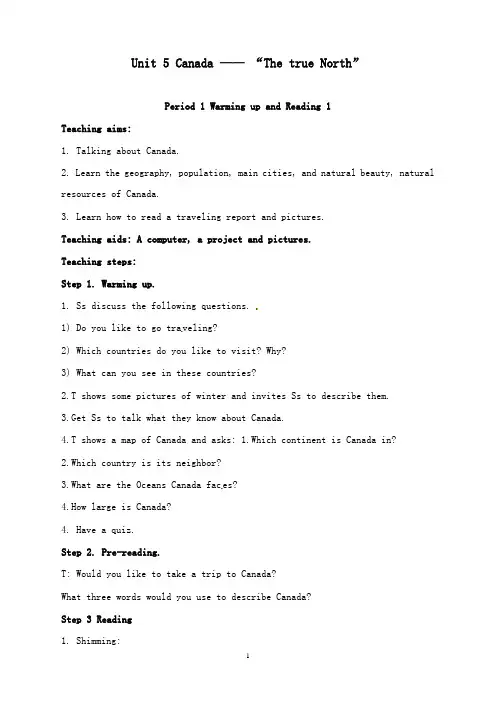
Unit 5 Canada ——“The true North”Period 1 Warming up and Reading 1Teaching aims:1. Talking about Canada.2. Learn the geography, population, main cities, and natural beauty, natural resources of Canada.3. Learn how to read a traveling report and pictures.Teaching aids: A computer, a project and pictures.Teaching steps:Step 1. Warming up.1. Ss discuss the following questions.1) Do you like to go tra veling?2) Which countries do you like to visit? Why?3) What can you see in these countries?2.T shows some pictures of winter and invites Ss to describe them.3.Get Ss to talk what they know about Canada.4.T shows a map of Canada and asks: 1.Which continent is Canada in?2.Which country is its neighbor?3.What are the Oceans Canada fac es?4.How large is Canada?4. Have a quiz.Step 2. Pre-reading.T: Would you like to take a trip to Canada?What three words would you use to describe Canada?Step 3 Reading1. Shimming:Get Ss to read the passage quickly and answer the following questions: 1) What is the passage mainly about?Sample:The passage is about a trip of two girls, and it tells us some information about Canada.2) What is “The Ture No rth”?Sample:“The True North” is the train that goes across Canada / the cross-Canada train.3) How many cities are mentioned in the text? What are they?Sample:Vancouver – Calgary—Thunder Bay—Toronto4) What do you know about each city?Vancouver :the warmest part of Canada; the most beautiful city in Canadamany Asian want to live there;the trees are extremely tall.the oldest and most beautiful forests in the worldCalgary:famous for StampedeCowboys come to compete in riding wild horses.good at working with animalsthey can win a lot of money in prizes.Thunder Bay:at the top end of the Great Lakes;very busy portclose to the centre of the country ,so that ocean ships can go there.2. Detailed reading:1) Get Ss to read the passage again and correct the following sentences.1. The girls went to Canada to see their relatives in Montreal.(in the East of Canada / on the Atlantic coast of Canada)2. Danny Lin was goi ng to drive them to Vancouver.(the train station to catch the cross-Canada train)3. You can cross Canada in less than five days by bicycle.(can’t)4. The girls looked out the windows and saw Native Indians and cowboys.(a grizzly bear, mountain goats and wild scenery)5. Thunder Bay is a port city in the south of Canada, near Toronto.(at the top end of the Great Lakes, near the center of the country)2) Listen to the tape and fill in the blanks from the text.Canada is _____ than the United States. It is the _______largest country in the world.It is _____ kilometers from coast to coast in Canada.The population of Canada is onl y slightly over_____________.Canada has _________ of the world’s fresh water, much of which is in the ___________.On the coast north of Vancouver some of the oldest and most beautiful _______ in the world still remain. It is so wet there that the trees are extremely ______.Period 2 Language points:1.Canada is a multicultural country like China. 加拿大像中国一样是一个多元化国家。
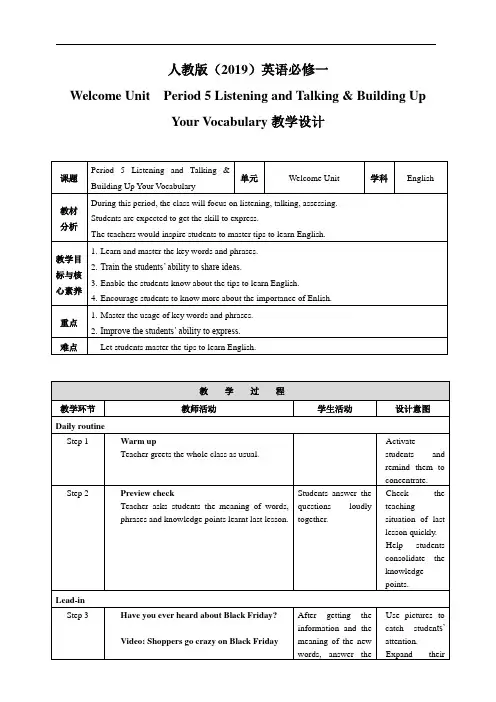
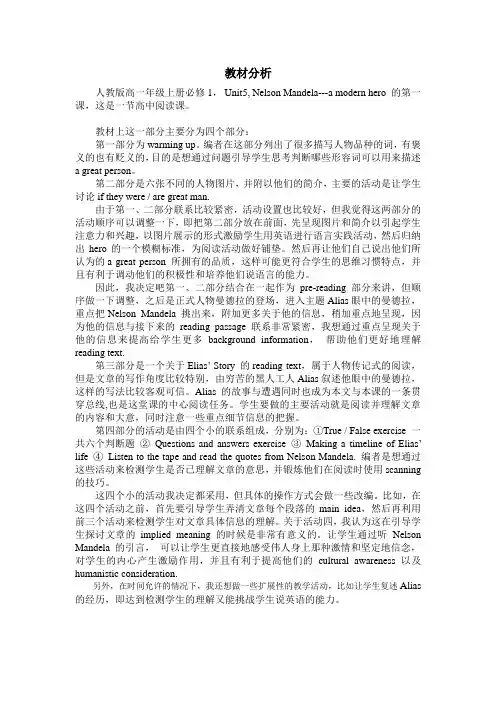
教材分析人教版高一年级上册必修1,Unit5, Nelson Mandela---a modern hero 的第一课,这是一节高中阅读课。
教材上这一部分主要分为四个部分:第一部分为warming up。
编者在这部分列出了很多描写人物品种的词,有褒义的也有贬义的,目的是想通过问题引导学生思考判断哪些形容词可以用来描述a great person。
第二部分是六张不同的人物图片,并附以他们的简介,主要的活动是让学生讨论if they were / are great man.由于第一、二部分联系比较紧密,活动设置也比较好,但我觉得这两部分的活动顺序可以调整一下,即把第二部分放在前面,先呈现图片和简介以引起学生注意力和兴趣,以图片展示的形式激励学生用英语进行语言实践活动,然后归纳出hero的一个模糊标准,为阅读活动做好铺垫。
然后再让他们自己说出他们所认为的a great person 所拥有的品质,这样可能更符合学生的思维习惯特点,并且有利于调动他们的积极性和培养他们说语言的能力。
因此,我决定吧第一、二部分结合在一起作为pre-reading 部分来讲,但顺序做一下调整,之后是正式人物曼德拉的登场,进入主题Alias眼中的曼德拉,重点把Nelson Mandela 挑出来,附加更多关于他的信息,稍加重点地呈现,因为他的信息与接下来的reading passage 联系非常紧密,我想通过重点呈现关于他的信息来提高给学生更多background information,帮助他们更好地理解reading text.第三部分是一个关于Elias’ Story 的reading text,属于人物传记式的阅读,但是文章的写作角度比较特别,由穷苦的黑人工人Alias叙述他眼中的曼德拉,这样的写法比较客观可信。
Alias的故事与遭遇同时也成为本文与本课的一条贯穿总线,也是这堂课的中心阅读任务。
学生要做的主要活动就是阅读并理解文章的内容和大意,同时注意一些重点细节信息的把握。
《Unit 5 Music》单元教案Unit 5 MusicListening and Speaking【教学目标】1. Instruct students to get main facts by listening and motivate them to talk about the topics about music, the types of music, and how the music makes them feel.2. Develop students’ sense of cooperative learning and individual thinking capability.3. Develop students’ different listening skills to solve different listening comprehensive problems.4. Help students to under stand how to use the structures “past participle as adverbial”.【教学重难点】Prompt students to talk about the related topics, such as types of music they know, their favourite type of music, how music makes them feel, and how to use past participle as adverbial.【教学过程】Step 1 Lead inThe teacher is advised to talk with their students about music.Boys and girls, before we listen, let’s work in pairs and discuss what type of music you know.Which type is your favorite? How does it make you feel? Share your ideas with partners.I know Chinese traditional music/classical music/country music/hip-hop/jazz/pop music/Latin music/rap/rock/punk…I like classical music. It makes me feel full of energy and happy.Step 2: PredictionAfter their small talk, the teacher can move on by finishing the following task: See the pictures and give the correct answers.1. What are the people doing in the picture below?2. Match the pictures with the correct types of music.A. Chinese traditionalB. classicalC. country musicD. hip-hop1_______________2_______________3_______________4_______________Step 3: Summary of the main ideaListeningI. Play the radio about The Sound of Music (音乐之声), and let students finish the following tasks.A star has come out to tell me1.___________________ to goBut deep in the dark-green shadowsAre voices that urge me to staySo I pause and I wait and I listenFor one more sound for one more lovely thing2.___________________ might say…The hills are alive with the sound of musicWith songs they have sung 3.__________________The hills fill my heart with the sound of musicMy heart 4.__________________ every song it hearsMy heart wants to beat like the wings of the birds that rise from the lake to the treesMy heart wants to sigh like the chime that flies from a church on a breezeTo laugh like a brook 5.__________________ and falls over stones in its wayTo sing through the night like a lark who is 6._____________I go to the hills when my heart is lonelyI know I will hear what I’ve heard beforeMy heart will 7.______________ the sound of musicAnd I’ll sing once moreII. The reporter paraphrased some of the answers the students gave him. Listen to the interviews again and complete the sentences with the words you hear.1. A: Country music touches my heart.B: So you like music that’s _______of _______?2. A: When I listen to hip-hop, I just have to move!B: So it makes you want to _______?3. A: Classical music makes m e feel like I’m sitting beside a quiet stream and enjoying nature.B: So to you, it’s _______ and _______?Learning new wordsList the new words in the lesson, tell students the meaning of these words and give some examples.News words: classical, energy, soul…Talking projectGuide students to do speaking practice.I. Talk in pairs. Interview each other about music. Use the picture below for ideas.A: What kind of music do you like?B: I like techno music.A: What makes it so special to you?B: I like to listen to it when l exercise. It gives me energy.II. Work in pairs or groups and role play a conversation.●Suppose you are a reporter and interviewing the students who about music.➢I like to…➢Chinese traditional song/classical music/hip-hop music/country music…➢Listen to/play/sing…Unit 5 MusicListening and Talking【教学目标】1. Instruct students to get main facts by listening and motivate them to talk about music festival, and what you would like to do in the music festival.2. Develop students’ different listening skills to solve different listening comprehensive problems.3. Help students to understand and talk about preference.【教学重难点】1. Listen to people who discuss their music festival.2. Grasp some listening skills and the rules of pronunciation.【教学过程】Step 1 Lead inThe teacher is advised to talk with their students about music festival.Boys and girls, before our listen, let’s work in pairs and discuss what music festival is.What would you like to do in the music festival? Share your ideas with partner.Step 2: Summary of the main ideaListeningLet students listen the announcement and answer the questions.What kind of songs will Grace Davis sing at the festival?Who can try out as a performer?What can those who think they do not have musical talent do?How can students volunteer to take part?Learning new wordsList news words: equipment, talent, assume, in addition (to sb./sth.) and give some examples.It is generally ___________ (assume) that stress is caused by too much work.He had a gift ___________ music when he was just 6 years old, so we allconsider him to be a ___________ (talent) musician.He a ________ (equip) himself with a street plan.他随身带着一张街道平面图。
人教版高中一年级必修1表格版单元教案Unit5 Nelson Mandela-a modern hero●教学目标本课时主要是通过学生对学案所给出的内容的学习,了解本课文中所出现的词汇,初步了解课文以及相关的背景知识,对下一堂课全面理解起到一个铺垫作用。
●教学地位人物是阅读理解中常见的类型,学生通过本单元的学习,学会如何理解文章的主旨大意和细节分析,对阅读理解的提高很有帮助。
●新课导入建议展示课前所搜集的图片,以竞猜的方式导入新课。
多媒体展示图片,设置问题,引发学生思考……●教学流程设计导入新课。
→学生阅读“美文阅读”与“诱思导学”(见学案第61页)。
→学生就“美文阅读”进行讨论,统一答案。
学生再次阅读课文(见课本第34页)并完成“语篇理解”(见学案第62页)。
←师生共同讨论并统一答案。
←让学生快速阅读课文(见课本第34页)并完成“篇章结构”(见学案第61页)。
↓学生共同讨论,并让学生发表各自见解,最后统一答案。
→学生再次仔细阅读课文(见课本第34页)进行深度理解,并完成“课文缩写”(见学案第62页)。
→老师指导学生讨论,共同找出答案。
↓让学生根据所给出的表格进行自我评估(见学案第62页)。
←学生讨论,并让学生代表发表他们讨论得出的答案。
老师予以更正。
←让学生完成“知识初探”部分(见学案第62页)。
↓老师布置作业,让学生看课本第34页并完成课本第35页第1、2、3、4题,预习学案Period Ⅱ(见学案第63页)。
Unit5 Nelson Mandela-a modern hero Period 1(ELIAS’ STORY)AimsTo talk about people’s qualitiesTo read about enable people’s life storyTo study The Attributive Clause (where, when, why, prep.+ which/ whom) To learn to write lettersdetail informatio True: 2, 4 False: 1, 3, 5, 6, 7, 8 b. Scan the text and do Comprehending Ex. 2.3.Questions for further understandingDiscuss the following questions in groups of four:a.How did the white people stop theblack people from being treated fairly?b.Why did Elias support Mandela?c.Why did he support violence whenhe did not agree with it?What do you learn about Nelson Do you like the way Elias tells I know that Mandela is a great leader who fought for equal rig hts for the black people all through his life. He organized the ANC Youth League which fought against the government. He is in favor of peaceful fighting. He is kind, helpful, generous, brave, and determined.downan Ask the student to do an interview inpairs. A journalist is interviewingElias with the following questions:When did you first meet Mandela?Can you tell me more about how hehelped you?Canabout the problemsthatpeople are facing?Unit5 Nelson Mandela-a modern hero Period 2(The Attributive Clause: where, when, why, prep.+which/ whom)AimsTo help students learn about attributive clause introduced by when, where, why, and prep.+ which/ whomTo help students discover and learn to use some useful words and expressionsTo help students discover and learn to use some useful structuresReady attributive Definitions: Attr ibutive clause: Anattributive clause is a clause modifying a noun or pronoun in a compoundsentence.Antecedent: The word being modifiedby an attributive clause is called theantecedent.Relative: The word that is used tointroduce an attributive clause iscalled a relative. There are two kindsof relatives, i.e. relative pronounsincluding which, that, who, whom,whose, as, etc.Note:Relativesplaysimportantrolesattributiveclause,introducing anattributiveclause1.The weatherturned out tobe very good,____ was morethan we couldexpect.A. whatB.which C. thatD. itUnit5 Nelson Mandela-a modern hero Period 3 AimsTo help students read the passage THE REST OF ELIAS’ STORYTo help students to use the language by reading, listening, speaking and writing●教学目标(1)熟记学案中所列出的单词和短语。
【2019统编版】人教版高中英语必修第二册Unit 5《Music》全单元备课教案教学设计Unit 5 MusicListening and Speaking【教学目标】1. Instruct students to get main facts by listening and motivate them to talk about the topics about music, the types of music, and how the music makes them feel.2. Develop students’ sense of cooperative learning and individual thinking capability.3. Develop students’ different listening skills to solve different listening comprehensive problems.4. Help students to understand how to use the structures “past participle as adverbial”.【教学重难点】Prompt students to talk about the related topics, such as types of music they know, their favourite type of music, how music makes them feel, and how to use past participle as adverbial.【教学过程】Step 1 Lead inThe teacher is advised to talk with their students about music.Boys and girls, before we listen, let’s work in pairs and discuss what type of music you know.Which type is your favorite? How does it make you feel? Share your ideas with partners.I know Chinese traditional music/classical music/country music/hip-hop/jazz/pop music/Latin music/rap/rock/punk…I like classical music. It makes me feel full of energy and happy.Step 2: PredictionAfter their small talk, the teacher can move on by finishing the following task: See the pictures and give the correct answers.1. What are the people doing in the picture below?2. Match the pictures with the correct types of music.A. Chinese traditionalB. classicalC. country musicD. hip-hop1_______________2_______________3_______________4_______________Step 3: Summary of the main ideaListeningI. Play the radio about The Sound of Music (音乐之声), and let students finish the following tasks.A star has come out to tell me1.___________________ to goBut deep in the dark-green shadowsAre voices that urge me to staySo I pause and I wait and I listenFor one more sound for one more lovely thing2.___________________ might say…The hills are alive with the sound of musicWith songs they have sung 3.__________________The hills fill my heart with the sound of musicMy heart 4.__________________ every song it hearsMy heart wants to beat like the wings of the birds that rise from the lake to the treesMy heart wants to sigh like the chime that flies from a church on a breezeTo laugh like a brook 5.__________________ and falls over stones in its wayTo sing through the night like a lark who is 6._____________I go to the hills when my heart is lonelyI know I will hear what I’ve heard beforeMy heart will 7.______________ the sound of musicAnd I’ll sing once moreII. The reporter paraphrased some of the answers the students gave him. Listen to the interviews again and complete the sentences with the words you hear.1. A: Country music touches my heart.B: So you like music that’s _______of _______?2. A: When I listen to hip-hop, I just have to move!B: So it makes you want to _______?3. A: Classical music makes me feel like I’m sitting beside a quiet stream and enjoying nature.B: So to you, it’s _______ and _______?Learning new wordsList the new words in the lesson, tell students the meaning of these words and give some examples.News words: classical, energy, soul…Talking projectGuide students to do speaking practice.I. Talk in pairs. Interview each other about music. Use the picture below for ideas.A: What kind of music do you like?B: I like techno music.A: What makes it so special to you?B: I like to listen to it when l exercise. It gives me energy.II. Work in pairs or groups and role play a conversation.●Suppose you are a reporter and interviewing the students who about music.➢I like to…➢Chinese traditional song/classical music/hip-hop music/country music…➢Listen to/play/sing…Unit 5 MusicReading and Thinking【教学目标】1. To acquire the basic usage of the new words and express concerning how computers and the Internet help us experience music.2. Enable students to understand the main information and text structure of the reading text.3. Enable students to understand past participle as adverbial.【教学重难点】1. Guide students to pay attention to reading strategies, such as prediction, self-questioning and scanning.2. To talk about the advantages and disadvantages of being a member of virtual choir.3. Lead students to understand past participle as adverbial;【教学过程】Step 1 PredictionAsk students the question.How can computers and the Internet help us experience music differently?Step 2: Learning new wordsLearn words:perform,enable,prove,award,and fall in love with…New words practiceIn order to have a good _______________ (perform), I have made good preparations for it.At present, developing the ___________ (able) of the students is an important task in our daily teaching activity.Step 3: Learning sentence patternsIntroduce the sentence patterns in the lesson and give some examples and explanation1. as 引导定语从句,意为“正如,正像”2. 过去分词(短语)作状语as引导定语从句的常用句式有:as is known to all 众所周知as we all know我们都知道as we can see正如我们所看到的as is reported正如报道的as is often the case这是常有的事as is mentioned above如上所述Step 4: Fast reading tasksGuide student to read the article quickly, teach some reading skills and do some exercises.Task of the first fast reading:Read quickly and figure out the key words of each paragraph.•Paragraph 1: enable•Paragraph 2: award•Paragraph 3: performanceTask of the second fast reading:1. What is mainly discussed in this passage?2. Which paragraph mentions background information about the virtual choir?3. Which paragraph mentions the conclusion of the virtual choir?Step 5: Careful reading tasksGuide student to read the article carefully and do some exercises.1. What is the attitude towards the virtual choir?2. Why does the virtual choir prove to be a good influence on the lives of many people?3. If you want to take part in a virtual choir, you need….Step 6: Study reading tasksAnalyze two difficult sentences in the text.1. Imagine having the opportunity to sing together with hundreds of other people while you are at home alone.2. A virtual choir enables them to add their voices to those of other individuals and become part of the global community.Step 7 Homework:Review what we have learned and find out the key language points in the text.Unit 5 MusicDiscovering Useful Structure【教学目标】1. Get students to have a good understanding the basic usage of past word segmentation as past segmentation as predicative and adverbial.2. Strengthen students’ great interest in grammar learning.3. Instruct students to express their ideas with this grammar correctly.【教学重难点】How to enable students to use the structure and meaning of past word segmentation as past segmentation as predicative and adverbial.【教学过程】Step 1 Lead-inGive some messages and ask students to guess who she is.英语过去分词的句子。
Unit 5 Nelson Mandela – a modern hero 一、单元教学目标和要求(Teaching aims and demands) 二、教材内容分析(Analysis of the teaching materials) 三、教学安排(Teaching arrangements) 四、单元预习任务(Pre-unit Activities: Preview Task) 五、教学步骤 (Teaching procedures) 六、背景参考资料(Background knowledge) 七、评价与反思(Assessment and reflection)
一、教学目标和要求 (Teaching aims and demands) 根据课程标准实验教材(英语 必修)关于总目标的具体描述,结合高一学生实际和教材内容,我们将教学目标分为语言知识、语言技能、学习策略、情感态度和价值观四个方面。 1. 语言知识 (Knowledge) 词汇(Vocabulary): 能理解、内化、运用以下生词---- hero, quality, willing, active, republic, fight, peaceful, prison, prisoner, period, law, advise, continue, fee, gold,youth,league,stage,vote,position,accept,violence,equal,blanket,degree,guard,educated,terror,fear,cruelty,reward,right(n.),criminal,leader,president,sentence(v.),sincerely
短语(Phrases and expressions):lose heart, in trouble ,worry about, out of work, Youth League, as a matter of fact, blow up, put ... in prison, come to power , set up , be sentenced to
功能(Functions):学习掌握一些用于发表意见与评论的结构句式,如: 1.发表意见 (Giving opinions) 2
Why do you think so? What do you think of ...? What's you opinion? agree / don't agree.I think / don't think .... I prefer .... In my opinion .... I'm afraid .... 2.评论 (Making comments) Good idea! That's an excellent idea. 语法(Grammar):定语从句(II)(由where, when, why, 介词+ which, 介词+ whom引导的定语从句)
The school where I studied only two years was three kilometers away. This was a time when you had got to have a passbook to live in Johannesburg The reason why I got a job was because of my hard work. …we were put in a position in which we had either to accept we were less important, or fight the Government. The person to whom you should be grateful for a peaceful South Africa is Nelson Mandela.
扩展词汇: negative(消极的), heroine(女主角,女主人公), unwilling(不情愿的), nation(国家,民族), sacrifice(牺牲),realize(认识到), give up(放弃), riches(财富), Bible(圣经), revolution(革命), career(职业), equality(平等), fairness(公平), conflict(冲突), biography(自传), beliefs(信仰), Christianity(基督教), religion(宗教), priests(牧师), version(翻译), readable(易读的), adventure(冒险), scholar(学者), sympathy(同情), ,campaign(从事活动), communist(共产主义者), injustice(不公平), oppose(反对), pilot(飞行员), boycott(联合抵制)。 2. 语言技能 (Skills) 听:在本单元的课文及练习册听力教学中, 能听懂人物和事件以及它们的关系,能抓住所听语段中的关键词,正确理解话语间的逻辑关系。 说:在本单元的课文及练习讨论时, 能恰当使用I think/ I don’t think/ in my 3
opinion/That’s an excellent idea等对英雄、伟人的品质恰当地发表意见,进行讨论。 读:能在阅读中使用不同的阅读策略,迅速地从阅读材料中获取主要信息,根据上下文线索预测故事发展,根据上下文猜测词义并通过不同渠道如报刊、音像、网络等了解更多伟人的情况。 写:能用恰当的语言简单地描述人物,并简单地表达自己的意见。 3. 学习策略(Strategy): 1.在听和读的训练中,学会借助情景和上下文猜测词义或推测段落大意,借助图表等非语言信息进行理解和表达。 2.主动制定本单元学习计划,客观评价自己的学习效果,在课内外活动中积极用英语交流,有效地使用词典、图书馆、网络等媒体资源来获得更多的有关伟人的英语信息。 4. 情感态度和价值观(Affect and Values) 了解Nelson Mandela的生平事迹,认识伟人所应具备的优秀品质,并向他们学习,以提高自身素质,树立正确的人生观,学习他们在艰苦的环境下为人类做贡献、不追求享乐的高尚精神。同时也学会一分为二的态度客观看待事物。
二、教材内容分析(Analysis of the teaching materials) 本单元的中心话题是当代英雄纳尔逊·曼德拉。故事的主题内容分成三个部分,由穷苦的黑人工人伊莱亚斯叙述他眼中的曼德拉。这样的写法虽然只能反映出曼德拉的一个侧面,但读起来却更为客观可信,使学生对曼德拉有初步的了解。第一篇阅读短文伊莱亚斯向我们介绍1952-1963年期间的曼德拉。第二篇听力短文伊莱亚斯讲述了他为了争取与白人有平等的权利而参加了曼德拉的非洲国民大会青年联盟。第三篇阅读短文伊莱亚斯说到他在罗本岛监狱得到了曼德拉的帮助,非国大(ANC)掌权后,伊莱亚斯又回到罗本岛监狱担任导游。这有别于惯常采用的直叙手法,尽可能剔除作者的主观看法,留给学生更多的思考空间,启发学生自己去思考,主动地表述对自己心目中英雄人物的看法。为了让学生完成写作任务,教科书又提供了曼德拉的生平履历表,让学生对曼德拉有了一个更完整的认识。“热身”(Warming Up)部分要求小组讨论伟人应具有的品质,并通 4
过一组问题让学生了解彼此的特点与看法。“读前”(Pre-reading)部分提供了一些重要的历史人物,要求学生读懂每个人的基本情况,并判断他们中谁能称得上是伟大的人。“语言学习”(Learning about Language)部分突出了词汇和语法的学习与训练。本单元的语法是when, where, why, 介词+ which,介词+ whom引导的定语从句。“语言运用”(Using Language)部分中包括了听、读、写三个部分的内容,是本单元主要阅读篇章故事的延续。学生可从中了解南非黑人当时的生活状况以及他们不平等的社会地位,发现曼德拉的伟大之处。该部分提出的一些问题有利于培养学生独立思考的能力和人文精神。其中“写作”(Writing)部分是训练学生选取和组织材料,写出具有说服力的书信。练习册的写作要求学生学写有关伟人或名人的生平。“学习建议”(Learning Tip)指导学生收集、选择和分析有关名人的材料,了解人们对这些名人的评论,以学会正确地评价人物。
三、教学安排(Teaching arrangements)
Period 1: Reading I (Elias’ story +the rest of Elias’ story) Period 2: Reading II (review +listening (sb)+language points) Period 3: More language input (reading task (wb) + listening (wb)) Period 4: Language Practicing (grammar) Period 5: Writing 本教学安排根据“LARA教学原则”,对教材进行大胆的删除(L – leave out)、 修补(A – Amending)、替换(R – Replace)、增添(A – Add),灵活的将教材为我所用。新教材在选材和教学活动的设计上充分考虑到学生年龄特征和他们生理和心理发展的需要;在采用话题、功能、结构相结合的教学方法的基础上,设计了“任务型”的活动;对英语语言知识和技能训练作了系统的安排,循序渐进,循环反复,有利于学生构建知识系统;注意培养创新精神,提高实践能力。但新教材也应与学生的实际相结合,我们不能全盘照搬。同时在教学过程中,为了对教学有及时的反馈和有效的改进,我们还进行了“形成性评价”,体现了学生的主体地位。 本单元的语言技能和语言知识几乎都围绕“当代英雄”这一中心话题设计的。